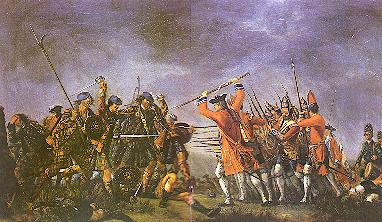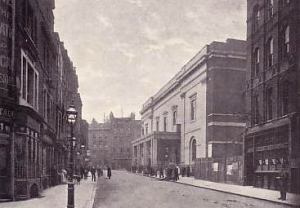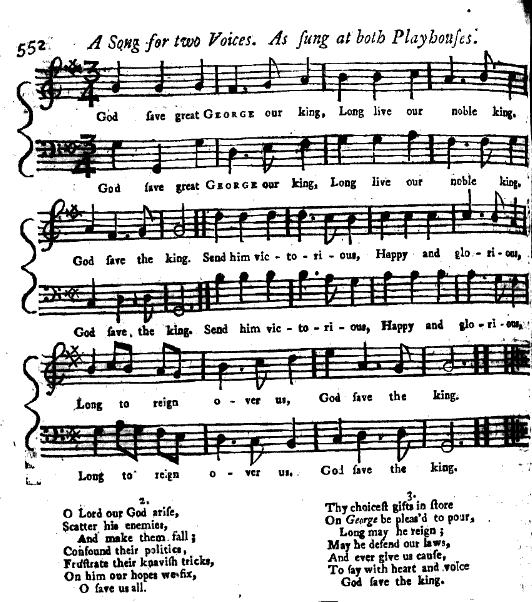

Saul has slain his thousands, But David his ten thousands.'Nor do we know the tune that went to:
When Adam delved and Eve span, Who was then the gentleman?But we do know the tune of the Agincourt song. When we come nearer to our own time, to the seventeenth century and later, our information is more complete, and we may study something of the interaction between song and history.
The song which nerves a nation's heart Is in itself a deed.The custom of adopting one particular song as a national anthem is comparatively modern. Many have evolved from unknown beginnings; vox populi has raised them into pre-eminence. Some have been imposed by authority. But no song becomes or remains a national anthem unless it affects the people's imaginations in a unique way, unless it symbolizes national characteristics and national aspirations. Then, by constant repetition at all official and solemn moments, it acquires an influence and an attraction whcih no other national song can possess.
But, it may be asked, can it seriously be maintained that anything so devoid of precise meaning as a tune, without its words and its associations, can express anything so impalpable as a national characteristic? [...] We could not ascribe the tune Giovinezza to Germany or that of the Horst Wessel Lied to Italy without doing violence to something fundamental in our ideas. We feel that the Marseillaise is as French as God save the King is English.
Songs That Made History: It is curious how little that is certain is known about the origin of words and music of the most widely known song in the English language. In song-books and hymn-books we find the tune of God save the King ascribed, sometimes to John Bull, sometimes to Henry Carey, sometimes to Doctor Arne. Other Books are, wisely, non-committal, and state, simply: 'Source unknown.'
One fact is known with precision, the date and occasion of a famous public performance, supposed to be the first public performance of the complete song; one which caused it to leap into popularity. This was on 28th September 1745. It was the year of the second Jacobite Rebellion. Charles Edward had, at Prestonpans,[43] heavily defeated the English forces sent to arrest his progress. On the morning of 28th September, the news reached London and caused consternation. For it was realized that a Jacobite invasion of England was inevitable. There was a good deal of support for the Jacobite cause in London. They were singing in the streets songs with words like:

Shall we basely crouch to tyrants? Shall we own a foreign sway? Shall a Royal Stuart be banished, While a stranger rules the day?
So the Whigs, the anti-Jacobites, those who held that George the Second, with all his disadvantages, was better for the country than another James, these realized that a good song was wanted, and at once, a song to steady popular feeling and to rally the adherents of the House of Hanover. So, at first sight it seems from nowhere, there suddenly emerged God save the King. It was sung on that evening of 28th September at Drury Lane Theatre, the music having been 'arranged' (note, not 'composed') by Dr. Arne, director of the music at the theatre.
Here is the notice of the performance from the Daily Advertiser of the following Monday: 'On Saturday night last, the audience at the Theatre Royal, Drury Lane, were agreeably surprised by the Gentlemen belonging to that House performing the anthem of God save our noble King. The universal Applause it met with, being encored with repeated Huzzas, sufficiently denoted on how just an abhorrence they hold the arbitrary Schemes of our insidious Enemies, and detest the despotick Attempts of Papal power.'
The song jumped at once into immense popularity, and it was sung at other public gatherings. Thus we read of its being performed at the Theatre Royal, Covent Garden, in December. So the performance at Drury Lane on that Saturday evening made history.
But two years earlier, in 1743, the music and two verses had been printed in a collection called Thesaurus Musicus; they seem to have attracted little attention. After it became popular, the statement appeared in print (in 1745) that the song consisted of 'the words and music of an old anthem that was sung at St. James's Chapel for King James II when the Prince of Orange was landed.' There are in existence wine-glasses made, it is supposed, about 1720 on which are inscribed verses of the anthem in a form quite close to that in which we sing them to-day. It seems likely, then, that the song dates back, at any rate, to the time of James II, and was originally a song in support of the Stuart cause.

John Bull was court musician to James I and a prolific composer for the virginals and harpsichord. In the middle of the nineteenth century, a certain Mr. Richard Clark acquired a manuscript book of harpsichord pieces which purported to be compositions of Dr. John Bull. Among these was the now famous Ayre. If it is played with all the sharps, so as to lie in the key of A major, the similarity of the tune to God save the King is apparent. But Mr. Chappell (compiler of that famous collection, Popular Music of the Olden Time) examined the book and stated that most of the sharps had been added by a later hand, presumably in order to make the music resemble more closely the tune as we know it. Shortly after this the book disappeared and has never been found. The Ayre as Bull wrote it should, therefore, stand in the minor, not the major.
Even so, it is difficult to resist the conclusion that the Ayre is an early, embryonic form of the well-known tune. It has the same unusual structure - six bars followed by eight - and there are similarities in the melodic lines. It must be remembered that the sixteenth- and early seventeenth-century composers of music for virginals and harpsichord often took popular tunes on which to found their keyboard studies.
It may be conjured, then, that this Ayre of Bull's is only his version, his arrangement, of a popular tune, sung to words which we do not know but which were current round about 1620; that the tune went on evolving, changing, as such tunes always did, and that at some time it picked up the words of God save the King. The combination of words and music was put on paper by 1688, was printed in 1743, and blazed into fame in 1745. This is largely conjecture, but it seems likely as it fits all the known facts.
But how about Henry Carey, to whom the tune is ascribed in the Scottish Students' Songbook and elsewhere? He composed round about 1740 - Sally in the Alley is the most famous of them. In 1795 made a claim that his father had composed the anthem, words and music, in 1743, and he asked for a pension on that account. He did not get the pension and the evidence he produced is unconvincing.
The opening words of the national anthem have been subjected to many changes. In the first printed copy they were:
God save our Lord the King, Long live our noble King.
But the words sung at Drury Lane in 1745 were:
God bless our noble King, God save Great George our King.
The reason for the change is obvious. So long as the name 'George' was not mentioned, Jacobites could join in the anthem con amore with a mental reservation as to the identity of the king. About this time, Charles Edward, in residence at Holyrood, gave orders that the clergy of Edinburgh were to pray for the rightful king, James III of England and VIII of Scotland. A Presbyterian minister got over the difficulty by starting his prayer thus: 'O Lord, save the King. Thou knowest, Lord, which King I mean.' There is, too, the charming and ingenious toast which Dr. Byrom wrote some years later:
God bless the King - I mean the Faith's Defender. God bless - no harm in blessing - the pretender. But who Pretender is, or who is King, God bless us all! - that's quite another thing.
In the reign of WIlliam IV, the anthem started:
God save our gracious King, William our noble King.
When Victoria came to the throne, an attempt was made to fit her name into the required metre. But 'God save Victoria the Queen' was too much of a mouthful for any one, and it was soon dropped in favour of the present form.
The circumstances of the first performance (that of 1745) throw light on the second verse. The 'politics' that were to be 'frustrated' and the 'knavish tricks' to be 'confounded' were those of the Stuart party. 'God save us all' meant, 'save us from a Jacobite government.' Incidentally, the last line but one was originally 'on him' (King George), not 'on Thee, our hearts we fix.' Many sets of words have been written to the tune. The rhymes of our first verse have often been criticized - 'victorious,' 'glorious,' 'over us.' But what about the rhyming of this stanza of a Scottish Jacobite version of 1760?
God bless the happy hour, May the Almighty Power Make all things well; That the whole progeny Who are in Italy May soon and suddenly Come to Whitehall.
Mention was made above of Jacobite wine-glasses on which are inscribed verses of the 'Jacobite hymn.' One of these, recently offered for sale in London, commemorates the birth of Prince Henry, afterwards known by the Jacobites as Henry IX, whom Benedict XIV created cardinal. He was born in 1725 and the four verses on the glass are as follows:
God save the King I pray
God Bliss the King I pray
God save the King.
Send Him Victorious
Happy and Glorious
Soon to Reign Over Us
God Save the King.
God Bliss the Prince of Wales
The True-born Prince of Wales
Sent Us by Thee.
Grant Us one Favour more.
The King for to Restore
As Thou hast done before
The Familie.
GOD SAVE THE QUEEN (Standard Version)
God save our gracious Queen,
Long live our noble Queen,
God save the Queen!
Send her victorious,
Happy and glorious,
Long to reign over us,
God save the Queen!
O Lord, our God arise,
Scatter her enemies
And make them fall;
Confound their politics,
Frustrate their knavish tricks,
On Thee our hopes we fix,
God save us all!
Thy choicest gifts in store
On her be pleased to pour;
Long may she reign;
May she defend our laws,
And ever give us cause
To sing with heart and voice,
God save the Queen!
When the monarch of the time is male,
"Queen" is replaced with "King" and
all female pronouns are replaced with
male pronouns. In addition, the lyrics
of the 3rd verse are slightly modified
to read:
With heart and voice to sing,
God save the King!
 Listen to God Save the Queen from:
Neil Young
Listen to God Save the Queen from:
Neil Young
 Watch God Save the King from:
Peter Dawson (1914)
Beethoven Variations
Paganini Variations
Watch God Save the King from:
Peter Dawson (1914)
Beethoven Variations
Paganini Variations
God save the Church I pray
And Bliss the Church I pray
Pure to remain.
Against all Heressie
And whigs Hypocrasie
Who strive Maliciously
Her to Defame.
God Bliss the Subjects all
And save both great and small
In ev'ry Station.
That will bring home The King
Who has Best Right to Reign
It is the only thing
Can Save the Nation.
The question is sometimes asked: 'Is the tune of our national anthem a good one?' It is the sort of question that few people of the British race would be prepared to answer. It is difficult to be critical of any music which is so familiar, so interwoven into our lives. Two great composers, neither of our race, have expressed their opinions on the subject of the tune. We shall see in a later chapter what were Haydn's reactions to it. Beethoven said: 'It must show the British people what a treasure they have in God save the King.' So he wrote a set of Variations on the tune. That they are not very successful Variations does not detract from his admirable intentions.
God save the King is the mother of national anthems. Many other countries borrowed it. It is still the official anthem-tune of Switzerland. There is an American popular song to it: My country,'tis of thee. Before the war, it was the national anthem of Prussia, sung to the words Heil Dir im Siegerkrantz.

But all the world over it is primarily the anthem and symbol of the British Empire. If the contention of the previous chapter is accepted, that national anthems symbolize national characteristics, we naturally ask ourselves the question: 'What are the national traits that are shown in the tune of God save the King?' It is difficult to put such things into words, but it is suggested that the tune in its slow dignity symbolizes a quality which we, as a nation, certainly value and to which we aspire. Foreigners call it British phlegm. We call it a certain steadiness of nerve; a refusal to be excited or bustled by an unexpected turn of events, however critical it may seem.
We have seen that both words and music of the national anthem have been subject to change. Even now, the tune is not fixed. Editions vary in their harmonies and in respect to the melody of the last phrase. The only arrangement which can be called authentic is that issued by Kneller Hall in 1933 at the request of King George V. During the war, the bands of the fighting services were constantly playing the national anthems of all the Allies. One result was that they instinctively quickened the tempi. In 1933 many bands were still playing God save the King with unseemly haste.
In the version then authorized, a slow tempo is laid down. At the express wish of King George V the first part was directed to be played or sung softly, so as to restore to it the character of a prayer. There is a crescendo in bar six, and the second part is played or sung loudly and at a rather slower tempo than the earlier part. When performed according to these directions, the tune gains in impressiveness. It is the arrangement now used by all Service bands. At the time the hope was expressed that other bands would follow this version, but the existence in print of other forms has prevented this uniformity.
About the time of the ending of the Great War, there were to be noticed the beginnings of
a change in the words of the national anthem. Some members of popular assemblies began to sing
'our' instead of 'the' in line 3. This became far more widespread about the time of the Jubilee -
a time when every village in the country had its triumphal arch with the almost invariable
device 'God bless our King and Queen.' The change has now extended to the last line as well.
The instinct which underlies it is not far to seek. So national songs, like organisms, are
modified according to biological principles.

Excerpt taken from: H.E. Piggott, Songs That Made History. J.M. Dent & Sons Ltd, London, 1937;
which is an expansion and a modification of the scripts of a course of broadcast talks given in the autumn of 1936.
Photo Credits:
(1) The Battle of Culloden, 1746,
(2) Theatre Royal, Drury Lane, 1890s,
(3) John Bull and his Dog,
(4) God Save the King, The Gentleman's Magazine, 1745 (unknown).